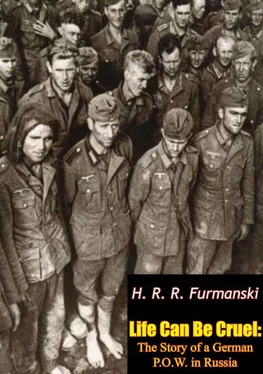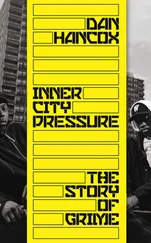H. Furmanski - Life Can Be Cruel - The Story of a German P.O.W. in Russia
Здесь есть возможность читать онлайн «H. Furmanski - Life Can Be Cruel - The Story of a German P.O.W. in Russia» весь текст электронной книги совершенно бесплатно (целиком полную версию без сокращений). В некоторых случаях можно слушать аудио, скачать через торрент в формате fb2 и присутствует краткое содержание. Год выпуска: 2016, Издательство: Pickle Partners Publishing, Жанр: Биографии и Мемуары, military_history, на английском языке. Описание произведения, (предисловие) а так же отзывы посетителей доступны на портале библиотеки ЛибКат.
- Название:Life Can Be Cruel: The Story of a German P.O.W. in Russia
- Автор:
- Издательство:Pickle Partners Publishing
- Жанр:
- Год:2016
- ISBN:нет данных
- Рейтинг книги:5 / 5. Голосов: 1
-
Избранное:Добавить в избранное
- Отзывы:
-
Ваша оценка:
- 100
- 1
- 2
- 3
- 4
- 5
Life Can Be Cruel: The Story of a German P.O.W. in Russia: краткое содержание, описание и аннотация
Предлагаем к чтению аннотацию, описание, краткое содержание или предисловие (зависит от того, что написал сам автор книги «Life Can Be Cruel: The Story of a German P.O.W. in Russia»). Если вы не нашли необходимую информацию о книге — напишите в комментариях, мы постараемся отыскать её.
An astonishing first-hand account.
Life Can Be Cruel: The Story of a German P.O.W. in Russia — читать онлайн бесплатно полную книгу (весь текст) целиком
Ниже представлен текст книги, разбитый по страницам. Система сохранения места последней прочитанной страницы, позволяет с удобством читать онлайн бесплатно книгу «Life Can Be Cruel: The Story of a German P.O.W. in Russia», без необходимости каждый раз заново искать на чём Вы остановились. Поставьте закладку, и сможете в любой момент перейти на страницу, на которой закончили чтение.
Интервал:
Закладка:
Soon after this another transport was planned, and I was among the three hundred men selected. We were issued new clothes and fed well for almost fourteen days, happily waiting for the time to come when we would march to the train station. It seemed certain that the new clothes had been given us to make a good impression on our return to freedom, but after six days of riding in the train we stopped at Zelenodolsk on the river Volga, our destination. The guard told us that we had to do reparation work for at least two more years. It seemed the final blow to our spirits, which now lapsed to a point of hopeless acceptance of the inevitable.
From now on we were on our own. The cost of our living was set at five hundred rubles a month for each of us, and we had to work very hard to meet our expenses, since there were some fifty men working inside the camp whom we were compelled to support. We alternated between two factories, one a paper mill and the other a wartime ammunition plant which was now producing aluminum. Our daily fixed quota was so extremely high that we could never fulfill it. I worked for some time in the paper mill, then inside the camp and, in the wintertime, on the river Volga, which was the hardest job. We had to break open the ice upon the river and fish out the logs which were floated in the summer but which were now frozen, pulling them out with long chains. Cold and wet, our clothes frozen to our bodies, we had to work doubly hard in order to keep warm. Many of us suffered frostbitten noses and ears, our hands and feet numbed by the intense cold.
While I was working in the paper mill I made friends with some Russian civilians, asking them about their way of life and how they felt about the Communist party. They would talk to me only when we were alone, fearing to be overheard by the Communists. I discovered that the Russian people were waiting for something to free them, but it would have to come from outside. I consider this to be true even today, regardless of the statements coming out of Russia. State-owned cooperatives (Kolkhozes) are not satisfying the people. The politburo has trained the people to work as industriously as if each individual was an owner, but personal interest in one’s work is entirely lacking. The rule is: He who is not working shall not eat; therefore, every human being must work regardless of what kind of work he does.
The same applies to family life: children of a certain age have to join the youth movement, and are taken away from their parents, to be trained in the communistic ideology and in the profession which seems most vital to the welfare of the nation. A citizen who makes the mistakes of talking against the Communists is tried before a political justice as a criminal against the security of the State and sentenced to hard labor far away from home, his partner in marriage deported in the opposite direction. There is no opportunity for such a family to be reunited, and the marriage is therefore annulled. Such is life under communism. I was born and raised in a good Christian family, where I learned about capitalism, democracy, and national socialism, and now, in Russia, I was living under the Communist system. I went through this “paradise for laborers” with open eyes, but I was unable to find one respect in which the system was not repugnant to freedom-loving people. Nobody owned private property; even radios were to be found only in the office of the political instructor, who listened only to what he was permitted to hear. In the apartments were loudspeakers, through which the occupants could listen only to what the instructor had tuned in. Cars and all other practical equipment were the property of the State. People in certain positions were permitted to make use of these cars, but nobody owned them. Who takes care of something that is not his own?
Farms and vital factories are the property of the State, all such institutions compelled to produce a quota which is fixed by the Department of Agriculture. The supervisors of these farms and factories are Communists, who shift the workers at will, to the places where they are most needed. If all the farms in one state produce only wheat, and all the farms in another state grow only potatoes, they still cannot exchange their product without permission from the authorities.
One incident which astonished me is indicative of the manner in which these people are treated. We were working on a new road and couldn’t fulfill our quota by a fixed date. One day before this date there appeared a truck filled with cleanly dressed women from the next town to lay the asphalt on the new road. I asked several women, “Why do you come here to work with asphalt in your good clothes?” The answer was shocking to me: the women had been in town, waiting in line for their groceries, when the police came and picked up all women on the street and brought them here to work. Their responsibilities as wives and mothers were of no concern to anybody; what was important was that the street be finished on time. Such incidents made me more determined than ever to keep alive the hope of returning to my own country, though when it would he was a question we could not answer.
I had to work in turns in the paper mill, in the aluminum factory, and on the Volga. We could thank the Lord for the fact that the time goes quickly even during periods when it seems that the food shortage will kill you. For two years we worked as hard as our physical constitutions would permit, never once reaching the prescribed quota. In mid-1947 about 50 men—those with some injuries and frostbitten limbs—were selected to be transported home. We were happy for them, because their lives were in danger under the conditions prevailing in Russia, but whether they reached their native country nobody knows.
After their departure only 250 men remained in camp. We did not know what fate had in store for us, though all of us hoped to be released some day. Near the end of 1947 there was much excitement in camp when somebody learned that our camp would be abandoned soon because we could not meet our expenses. We did believe that we would be repatriated now, but it proved to be only a rumor. Week after week passed with no break in our routine. One day in November we were not made to go to work; the fence was locked, and we were assembled to hear the news from the camp officer, who told us that we could not make as much money as was needed and that therefore this camp would be closed down within a week. He did not tell us what our own fate was to be, but we were issued clean uniforms, boots, and coats which came from the Russian Army, and fed well for almost fourteen days, which we took as a sure sign of impending repatriation. On the last day we marched smiling to the train station, entered the coach, and made ourselves as comfortable as possible, closing the doors and starting a fire in the stoves which were in the middle of each car. Late at night, when the train started to pull out, we were tired from excitement, and every one of us fell asleep. While we could not keep track of the direction in which we were heading, we did not doubt that we were going home. After the fourth day we planned to watch for the names of towns we were passing through, placing one man at a very small window. In the morning of the sixth day he turned from the window, frightened, to tell that we were heading east and right now were crossing the European-Asian border. We could not believe him, rushing to the window to see for ourselves.
It was true; we were going east. Where would be our destination? we asked ourselves. Were we to be made to endure another period of hardship? Lord help us, we thought. Disappointed from many years of captivity, undernourished and ill, it did not seem possible that we could endure further deprivation of a normal life. Five years had passed since I was captured, with no word from my parents and no sign of release. My will to live very nearly left me. My faith and hope wavered as I asked myself whether I could any longer believe in God. My spirit was assailed with doubt, but after a night of silent prayers I was filled with renewed faith. I had to be patient and to believe. I was still alive, and the chance of being released was always present. I strove to fight down my doubts, though I often wondered whether it would not be better if I were dead, for who knew what I would find when I returned to my country, whether I would find my relatives and under what conditions?
Читать дальшеИнтервал:
Закладка:
Похожие книги на «Life Can Be Cruel: The Story of a German P.O.W. in Russia»
Представляем Вашему вниманию похожие книги на «Life Can Be Cruel: The Story of a German P.O.W. in Russia» списком для выбора. Мы отобрали схожую по названию и смыслу литературу в надежде предоставить читателям больше вариантов отыскать новые, интересные, ещё непрочитанные произведения.
Обсуждение, отзывы о книге «Life Can Be Cruel: The Story of a German P.O.W. in Russia» и просто собственные мнения читателей. Оставьте ваши комментарии, напишите, что Вы думаете о произведении, его смысле или главных героях. Укажите что конкретно понравилось, а что нет, и почему Вы так считаете.












